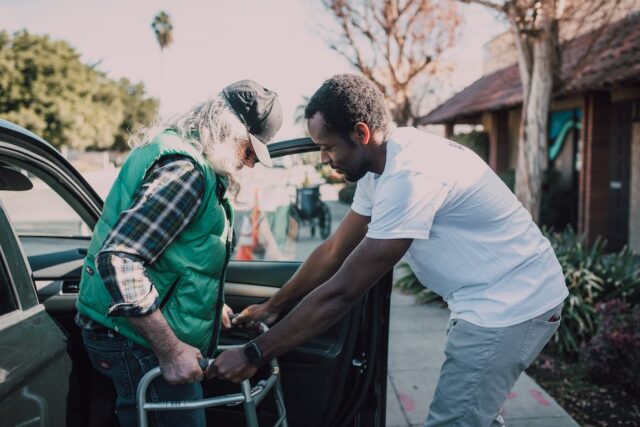Hospice Care For Children And Families: A Unique Approach
Hospice care, a compassionate approach to providing comfort and support during end-of-life journeys, extends its benevolent embrace to include children and their families as they grapple with the profound challenges of terminal illness. In this article, we delve into the indispensable role of hospice volunteer programs, led by dedicated hospice volunteers, in catering to the distinct needs of pediatric patients and their families. These programs are pillars of unwavering emotional support, nurturing resilience and understanding during an exceptionally trying period.
The Uniqueness Of Pediatric Hospice Care
Child-Centered Care:
Pediatric hospice care stands apart by its unwavering focus on the specific needs of young patients. It recognizes that children, at various stages of development, necessitate care tailored to their age, emotional maturity, and comprehension level. In this context, hospice volunteers who are specially trained to work with children become invaluable companions and wellsprings of comfort:
- Age-Appropriate Communication: Volunteers adept in child-centered care employ age-appropriate communication techniques that facilitate understanding and trust. They use language and approaches that resonate with children, ensuring they feel heard and cared for.
- Emotional Connection: Volunteers forge deep emotional connections with young patients, fostering an environment where children feel safe, valued, and free to express their thoughts, fears, and hopes.
Family-Centered Care:
The impact of a child’s terminal illness reverberates deeply within their family. Pediatric hospice care recognizes this and extends its mantle of support to encompass the entire family unit. In this holistic approach, hospice volunteers play a pivotal role in creating a nurturing and empathetic environment for families:
- Support Beyond the Child: Hospice volunteers recognize that the emotional needs of family members are equally significant. They offer solace to parents, siblings, and other relatives, acknowledging their grief and providing companionship during an emotionally turbulent time.
- Addressing Practical Needs: Beyond emotional support, volunteers assist families with practical needs, offering respite care, helping with daily tasks, and ensuring that parents and caregivers receive the support they require.
Hospice Volunteer Programs For Children And Families
Specialized Training:
Volunteers participating in pediatric hospice programs undergo specialized training that equips them to comprehend and respond to the unique needs of children facing terminal illnesses and their families. This training encompasses a range of critical aspects:
- Age-Specific Sensitivity: Volunteers learn to approach children with age-specific sensitivity, adapting their interactions and support to align with the child’s developmental stage and emotional capacity.
- Effective Communication Skills: Training empowers volunteers with effective communication skills tailored to young patients, enabling them to build trust, engage in age-appropriate conversations, and provide comfort.
- Family Dynamics: Volunteers gain insights into the complexities of family dynamics in the context of terminal illness, allowing them to navigate these dynamics with empathy and understanding.
In essence, pediatric hospice care, guided by the compassionate presence of dedicated volunteers, weaves a tapestry of care that is both child-centered and family-focused. It recognizes that each child and family is unique, with distinct needs and emotional landscapes. Hospice volunteers, armed with specialized training and boundless compassion, serve as beacons of support, illuminating the path with understanding, comfort, and unwavering companionship during a challenging and emotional journey.
Emotional Support:
Hospice volunteers play a pivotal role in providing the emotional support that children and their families desperately need as they navigate the emotional challenges of terminal illness. Their presence is a compassionate beacon of comfort and understanding:
- Creating a Safe Space: Volunteers create a safe and nurturing space where children can freely express their fears, hopes, and feelings. This safe environment fosters open communication and understanding, enabling children to voice their concerns and providing them with the reassurance that their emotions are valid and valued.
Activities and Services:
Play and Art Therapy:
Hospice volunteers engage pediatric patients in the therapeutic realms of play and art. These creative activities offer children an outlet to express themselves, often when words fall short. Through play and art therapy, young patients can:
- Express Emotions: Children use play and art to communicate their emotions, allowing them to process complex feelings related to their illness and end-of-life journey.
- Find Solace: These activities offer solace and distraction from the physical and emotional pain, providing moments of respite and enjoyment amid challenging circumstances.
- Create Lasting Memories: The creative endeavors undertaken during play and art therapy sessions result in tangible mementos and memories that families can cherish long after their child’s passing.
Respite for Caregivers:
Volunteers offer respite care, a crucial service that allows caregivers to take much-needed breaks from their demanding responsibilities. This respite care serves several essential purposes:
- Recharging Caregivers: Caregivers face immense physical and emotional demands while caring for their children. Respite care provides caregivers with the opportunity to rest, rejuvenate, and recharge, ultimately enhancing their ability to provide the best possible care.
- Reducing Burnout: Preventing caregiver burnout is essential to maintain the overall well-being of the family unit. Regular breaks offered by volunteers help reduce the risk of burnout, ensuring that caregivers can continue their vital role with renewed energy and dedication.
Embracing The Hospice Experience:
Celebrating Life:
Hospice volunteers encourage children and families to celebrate life, focusing on moments of joy and connection. This celebration of life is an integral part of the hospice experience:
- Joy Amid Challenges: Volunteers help families find and appreciate moments of joy, however small they may be. Celebrations, such as birthdays and holidays, are cherished and made memorable, providing precious memories for families to hold onto.
Supporting Grief and Bereavement:
Pediatric hospice volunteers understand that the journey does not end with a child’s passing. They continue to provide unwavering emotional support to families as they navigate the grieving process:
- Listening and Understanding: Volunteers offer a compassionate listening ear to grieving families, providing a space for them to share their thoughts, feelings, and memories of their child. This support helps families cope with the profound loss and navigate the complex emotions associated with grief.
- Resource Assistance: Volunteers connect families with valuable grief and bereavement resources, such as counseling services and support groups. These resources offer additional support in the grieving process.
Challenges and Rewards:
The Emotional Toll on Volunteers:
Pediatric hospice volunteering is not without its emotional challenges. Volunteers form deep bonds with children and families, knowing the inevitable outcome. To navigate these challenges effectively, comprehensive support mechanisms are essential:
- Support and Debriefing: Volunteers require access to ongoing support and debriefing sessions to help them cope with the emotional toll of their work. These sessions provide a safe space for volunteers to express their feelings and seek guidance on managing their grief and maintaining their resilience.
The Reward of Making a Difference:
Despite the emotional challenges, pediatric hospice volunteers find profound fulfillment in knowing they have made a positive impact on the lives of children and families:
- Creating Lasting Memories: Volunteers create lasting memories for families that provide immeasurable comfort during a difficult journey. The knowledge that they have brought moments of solace, joy, and understanding to those in need is a powerful and rewarding experience.
Conclusion:
In conclusion, hospice volunteer programs for children and families offer a lifeline of emotional support and understanding during the most challenging of times. These programs are uniquely tailored to address the specific needs of pediatric patients and their families, recognizing that the journey of end-of-life care is one that requires special care, compassion, and resilience. Hospice volunteers provide not only comfort but also celebrate life, create cherished memories, and make a lasting difference in the lives they touch. Through their dedicated service, they exemplify the true essence of compassionate care during times of immense need.














